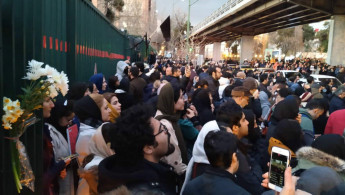Plane crash mourners rip Iran flag from victims' coffins in anger
Footage emerged on Thursday of mourners attending the funeral processions of Iranian victims of the 8 January plane crash, pulling the national flag off the coffins in an apparent show of anger towards the government over the disaster, which saw 176 people killed.
Mass protests broke out in Iran for four consecutive nights with thousands taking to the streets nationwide following the authorities' admission it unintentionally shot down the Ukrainian passenger jet moments after it had taken off from Tehran.
Comment: Is this Iran's 'Chernobyl moment'?
Videos circulating on Twitter showed individuals in the northwestern Kurdish-majority city of Mahabad ripping Islamic Republic flags off coffins being marched through crowds of mourners.
Twitter Post
|
Amnesty International accused Iranian security forces of using "unlawful force" against peaceful protests, citing their use of rubber bullets, tear gas and pepper spray, along with pointed air gun pellets normally used for hunting.
It said security forces also beat demonstrators with batons, kicked and punched them and made arbitrary arrests during protests on Saturday and Sunday.
The marginalisation of Kurds in Iran has led many to reject Iranian nationalism, however observers have pointed out this may have increased since the plane tragedy.
Anti-government slogans were also reportedly chanted at another funeral procession for plane crash victims in Sanandaj, another city in Iranian Kurdistan, where Iranian flags were also reportedly taken off the coffins.
Twitter Post
|
Despite the domestic unrest, Iran's foreign minister on Thursday ordered countries whose citizens died in the tragedy not to turn it into a "political issue".
Read more: The US never supported Kurdish secession, either in Syria or Iraq
Iranian Kurds make up about 7-10 percent of the country's population. According to an Amnesty report, Kurds in Iran face "deep-rooted discrimination," affecting their social, political, economic and cultural rights, leading to entrenched poverty in Kurdish regions.
Their marginalisation has led to a build-up of secessionist aspirations among some Iranian Kurds, increasing after the establishment in 2005 of an autonomous Kurdish Regional Government in Iraq.
Follow us on Twitter and Instagram to stay connected




 Follow the Middle East's top stories in English at The New Arab on Google News
Follow the Middle East's top stories in English at The New Arab on Google News
![The UAE is widely suspected of arming the RSF militia [Getty]](/sites/default/files/styles/image_330x185/public/2024-11/GettyImages-472529908.jpg?h=69f2b9d0&itok=Yauw3YTG)
![Netanyahu furiously denounced the ICC [Getty]](/sites/default/files/styles/image_330x185/public/2024-11/GettyImages-2169352575.jpg?h=199d8c1f&itok=-vRiruf5)
![Both Hamas and the Palestinian Authority welcomed the ICC arrest warrants [Getty]](/sites/default/files/styles/image_330x185/public/2024-11/GettyImages-2178351173.jpg?h=199d8c1f&itok=TV858iVg)